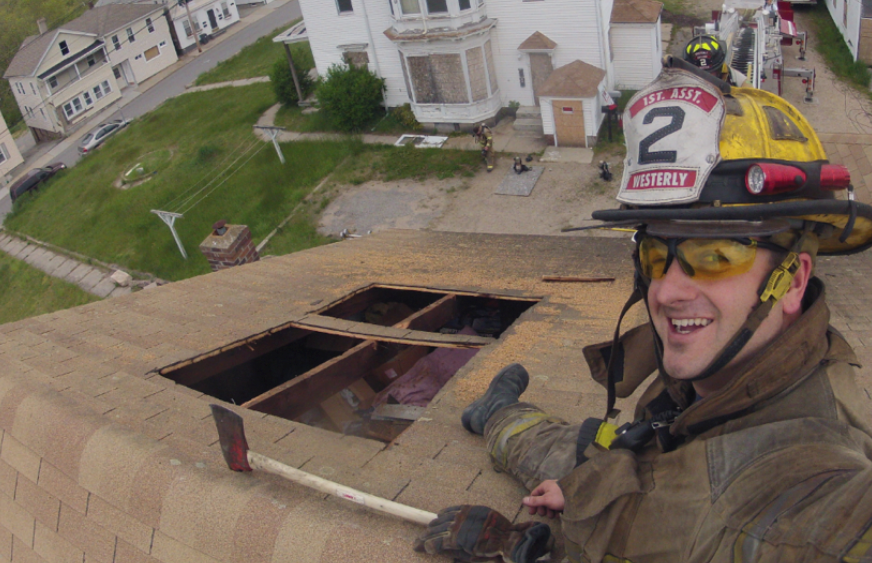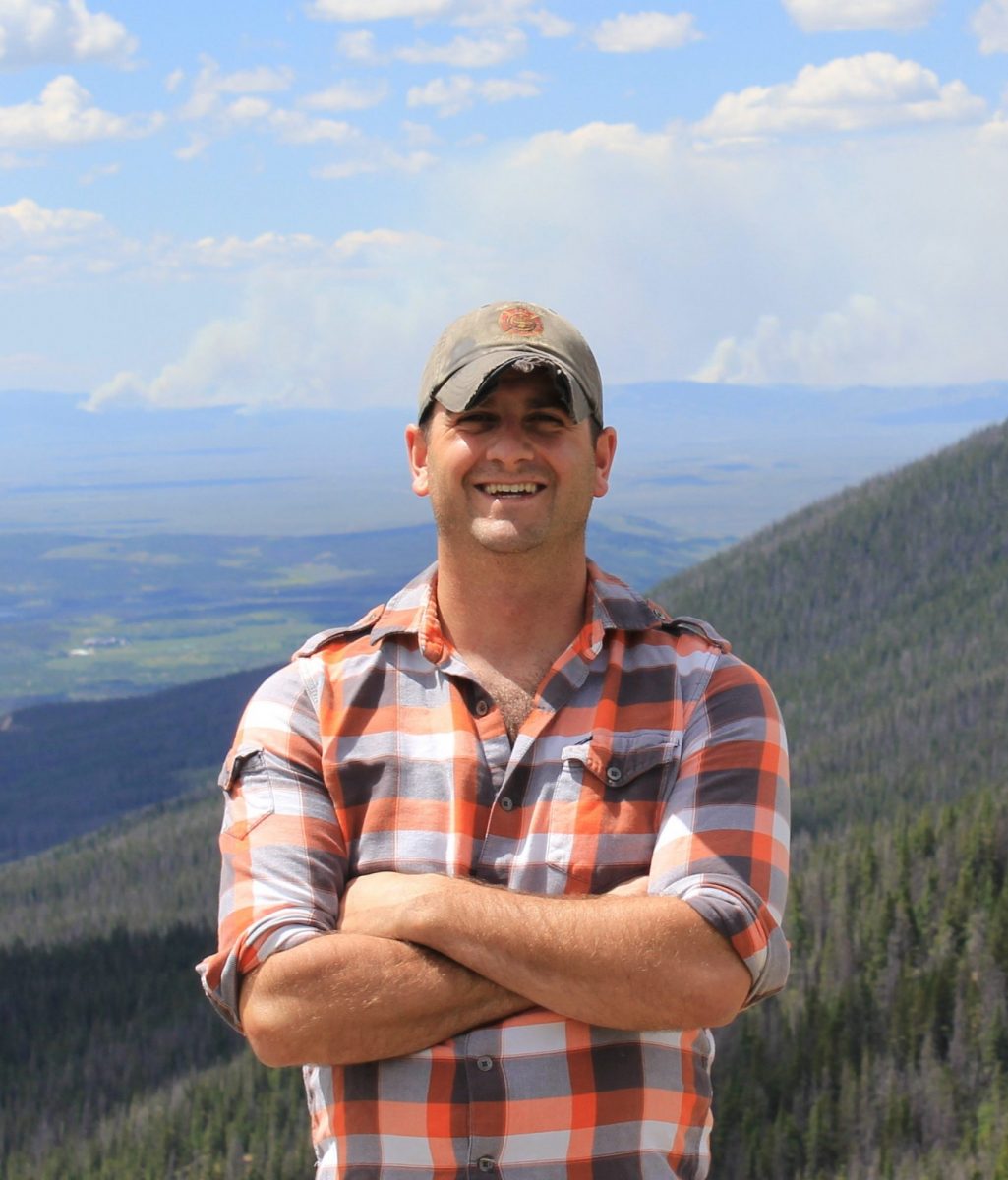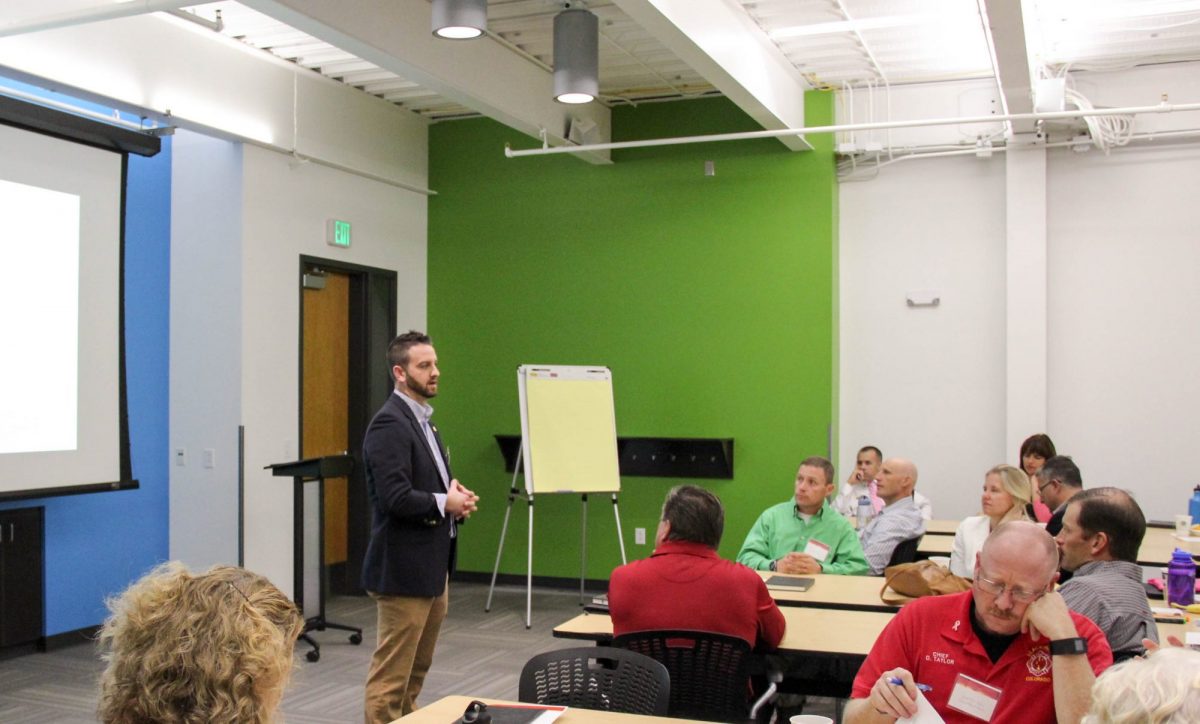Photo: Members of Poudre Fire Authority Station 1.
Tim Amidon’s father would tell you that Tim became a firefighter because he read Margaret Wise Brown’s The Little Fireman too many times when Tim was little.
An assistant professor of English at CSU, Amidon grew up surrounded by people in the service and working as first responders. In particular, his dad was in the Navy, and his best friends’ dad was in the Coast Guard as well as a volunteer in the fire department. When Amidon turned 16, he trained to be a lifeguard. “That first summer, I had some opportunities to help people and I realized that being a first responder was something that I enjoyed,” he says.
After two summers as a lifeguard, Amidon began volunteering as a firefighter at the Westerly Fire Department in Westerly, Rhode Island. Eventually, he moved into serving the department as a company officer, and was later appointed fire instructor with the Rhode Island Fire Academy, and a technician with Rhode Island Urban Search and Rescue. It would seem with these beginnings that he was on track to continue a long career as a first responder, but his career went instead into academia, based on the other major influence in his life: his family’s commitment to literacy and education.

“Growing up both my parents read a bunch, and my dad is probably the most voracious reader I’ve ever met. We had more books in our house than anyone else I knew,” Amidon says.
Amidon admits that he first went to college, “because it’s what you do.” As a surfer and a lifeguard, he loved the ocean, so began as a geological oceanography major. But he didn’t find a lot of options to take classes where there were opportunities to “talk about the world.” The curriculum was more rigid, its concerns material and scientific, and he struggled. He eventually found his way to the liberal arts and study of rhetoric; he was interested in how we write, and how what we write has political and social implications. It was a place where he could explore “how does writing do work in the world?”

Rhetoric and Risk
Amidon’s research interests include digital rhetorics, intellectual property, and multimodal literacies – literacy that takes place in spaces and communities beyond what we typically think of (like the environments where first responders work) – seeing meaning-making, communication, literacy, and even technology as more than just reading books and writing words on paper.
Recently, Amidon has been researching the role of firefighter communication in preventing disasters and tragedies. According to Amidon, about 100 firefighters die each year in the line of duty, and many more are seriously injured. Structural and equipment issues can play a role in these casualties, but communication problems are a factor that is often overlooked or misunderstood. If a firefighter is unable to correctly interpret fire behavior and communicate important information back to the rest of the team, for instance, the situation can quickly escalate to danger. Firefighters must learn how to use aural and radio literacy to rapidly process and prioritize communications in a high-stress environment.
“As I read the body of research on rhetoric and risk communication, I came to understand that there really isn’t much other work that looks at the ways blue-collar workers, like firefighters, use embodied literacies – tactile, kinesthetic, aural, visual, gestural literacies – to construct and communicate knowledge in risk environments,” he says.
“I’m really interested in how firefighters learn the many tacit forms of literacy they use to construct knowledge in risk settings, and how we might teach those literacies in more transparent ways so that firefighters have access to literacies and knowledge-making practices that would help them work more safely when they are in risk environments. Things like reading smoke, for instance, is something that is difficult to teach, but it happens. I'm especially interested in exploring how those types of literacies are acquired by new members of this discourse community.”

Over the past five years, Amidon and a group of colleagues who also work with firefighters at CSU, have formed an interdisciplinary research team and have been cultivating relationships with groups like National Fallen Firefighters' Foundation and National Volunteer Fire Council as well as leaders in a number of Coloradoan fire departments to refine and develop research methods that could help firefighters work more safely. An important component of this work is better understanding how improving information flow in operational (in the field) and non-operational settings (in fire houses and training yards) can be used to improve safety outcomes within the industry.
“Communicating in risk environments is highly challenging for a number of reasons. One is that first responders are working in time-sensitive contexts. Folks make decisions in seconds that have huge consequences for the emergency and the responders alike,” he says. “Another is that the environments themselves impact how responders make sense of information and communicate that information. There are issues of power, credibility, and trust that impact how decisions are made, but also the fact that firefighters often can’t hear, see, or talk well because they are working in gear and places that are loud or dark or where there is zero visibility.”
Rhetoric and Technology
Amidon teaches courses that explore the intersections between rhetoric, composing, and technology. “As a digital rhetorician, I’m predominately interested in how humans practice and enact literacies using technology systems (digital and pre-digital) to realize the collective and individual aims they have in locations like workplaces,” he says. For example, he asks students to consider the ways writing for web-based platforms can complicate our understanding of authorship and who “owns” the content we create.
Technology changes so fast that people find it difficult to keep up with the potential ramifications. We often adopt the technology before we investigate what using it is actually going to mean. Amidon suggests that even the designers of such systems don’t fully realize the implications that their systems will have on society.
“The recent testimony that Facebook executives and Jack Dorsey of Twitter forwarded in Congress highlights that the people building these platforms didn’t really expect to have the kinds of problems they do, didn’t predict the potential uses of the spaces, including trolling and bots and political influence campaigns. Platforms are being used in ways that the designers and the users don’t fully understand, and yet the social and political implications are profound. We didn’t think about the social, cultural, and ethical implications of these systems until after we started participating in them.
In education, we do the same – have engineers and designers build educational technology systems without a consideration of the ethics of use and the ramifications of how we practice with the technology. ‘What does it mean for this new technology to change the ways we do learning -- how do various technologies alter the ways that we read, write, communicate, and interact as educator and students in the shared activity of learning?"
Whether Amidon is investigating rhetoric and risk communication for first responders or how technology is yielding unanticipated impacts in the ways we communicate, his motivation is based on a sense of equity, compassion, and service.
“Reading and writing is how we organize our social and cultural activity as humans, so the choices we make in terms of reading, writing, literacy, and communication are fundamental to how we build and participate many of our systems, whether it’s a workplace or a school or civic system or how we relate with our own government…. We don’t have to just participate in systems as they are, we have agency. And as users and designers of systems, we have an ethical responsibility and have to carefully consider how we participate and build in those systems.”
